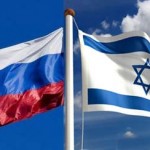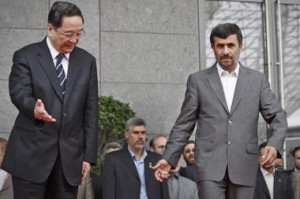Wednesday
Jun302010
Israel-Russia: Handshakes over Iran, Tensions over Hamas
 Wednesday, June 30, 2010 at 8:12
Wednesday, June 30, 2010 at 8:12  Israeli-Russian relations continue to run along a knife edge. President Shimon Peres used a reception with Estonian President Toomas Hendrik Ilves on Monday to praise Russia for adopting a more aggressive policy on Iran. He praised Russian President Dmitry Medvedev, speaking at the G-20 meeting in Toronto, for noting the “worrying” US assessments that Iran could build a nuclear weapon within two years.
Israeli-Russian relations continue to run along a knife edge. President Shimon Peres used a reception with Estonian President Toomas Hendrik Ilves on Monday to praise Russia for adopting a more aggressive policy on Iran. He praised Russian President Dmitry Medvedev, speaking at the G-20 meeting in Toronto, for noting the “worrying” US assessments that Iran could build a nuclear weapon within two years.“There is no doubt that this declaration cannot be taken lightly, because until now, Russia had doubts about Iran’s seriousness and ability to build a nuclear bomb,” Peres said. “Therefore, Medvedev’s declaration is a serious change, and Israel appreciates this development.”
Israel Analysis: Dark Clouds Over Netanyahu Before Washington Visit (Yenidunya)
However, in a meeting in Israel on Tuesday, Foreign Minister Avigdor Lieberman reportedly told his Russian counterpart Sergei Lavrov that West Jerusalem opposed Moscow's recent advances toward Hamas.
Lavrov countered that it was impossible to ignore the Islamist organisation's popularity amongst Palestinians, particularly in Gaza. He continued: "Russia is doing the right thing by contacting Hamas."
Faced with the Hamas-Palestine issue overtaking the goodwill from its stance on Iran, the Kremlin is using another tactic now by bringing in the members of the Arab League. Before moving to the West Bank, Lavrov said at a press conference that the Quartet mechanism --- the US, UN, European Union, and Russia --- needed to be expanded to be more effective.
Which is another way of saying to West Jerusalem: the ball's back in your court.


